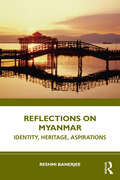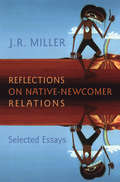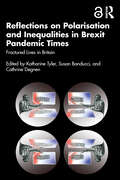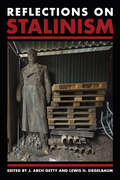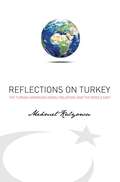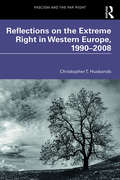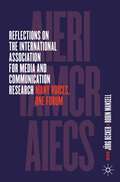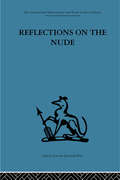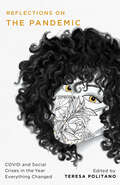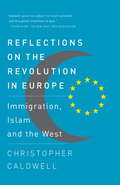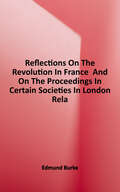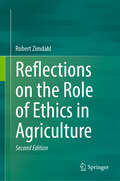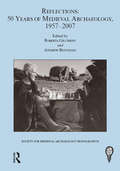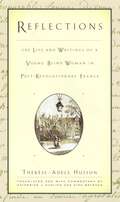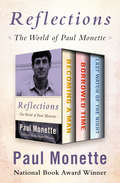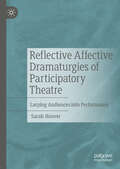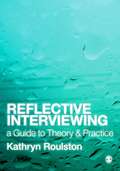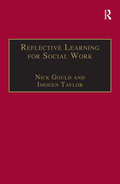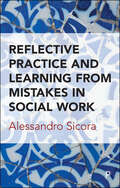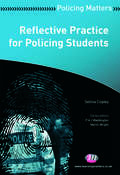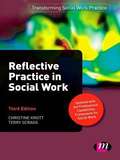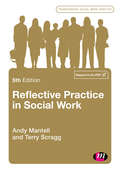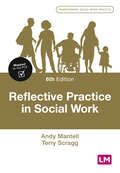- Table View
- List View
Reflections on Myanmar: Identity, Heritage, Aspirations
by Reshmi BanerjeeMyanmar is known for its engaging history, rich cultural heritage, and diverse ethnic communities. Its tumultuous political past has been discussed by academics and policy makers for decades; however, the land of the Shwedagon cannot only be defined by conflict and contestation. Myanmar is complex and multi-layered with innumerable issues shaping its identity and manifold interpretations creating its distinctiveness. A deeper comprehension of its past glory with thoughtful deliberation on its socio-economic challenges helps to understand the country better. This book fills this gap by focusing on four broad themes––reminiscence, restoration, re-evaluation, and resurrection. It studies interconnected issues ranging from nostalgia and belonging to Myanmar’s contribution to art and heritage (through its museums, cinema, folk traditions); from the problems of landlessness, resource dispossession, and climate change to the experience of marginalized groups. The author weaves these themes into a common narrative of discovering Myanmar through a holistic lens. The book aims to explore the country through its history, culture, communities, and challenges. A unique contribution, the book highlights the myriad facets of Myanmar by contemplating on its inherent strengths and visible weaknesses. It would be indispensable for scholars and researchers of Southeast Asian studies, Asian studies, area studies, Myanmar studies, political studies, cultural studies, and sociology.
Reflections on Native-Newcomer Relations
by J. R. MillerThe twelve essays that make up Reflections on Native-Newcomer Relations illustrate the development in thought by one of Canada's leading scholars in the field of Native history - J.R. Miller. The collection, comprising pieces that were written over a period spanning nearly two decades, deals with the evolution of historical writing on First Nations and Métis, methodological issues in the writing of Native-newcomer history, policy matters including residential schools, and linkages between the study of Native-newcomer relations and academic governance and curricular matters. Half of the essays appear here in print for the first time, and all use archival, published, and oral history evidence to throw light on Native-Newcomer relations.Miller argues that the nature of the relationship between Native peoples and newcomers in Canada has varied over time, based on the reasons the two parties have had for interacting. The relationship deteriorates into attempts to control and coerce Natives during periods in which newcomers do not perceive them as directly useful, and it improves when the two parties have positive reasons for cooperation. Reflections on Native-Newcomer Relations opens up for discussion a series of issues in Native-newcomer history. It addresses all the trends in the discipline of the past two decades and never shies from showing their contradictions, as well as those in the author's own thinking as he matured as a scholar.
Reflections on Polarisation and Inequalities in Brexit Pandemic Times: Fractured Lives in Britain
by Katharine Tyler Cathrine Degnen Susan BanducciThis is the first interdisciplinary edited collection that examines the manifestation of social inequalities and polarisations in Britain throughout the dual crises of the Brexit vote and the Covid-19 pandemic. The volume demonstrates that Brexit and the pandemic are not self-contained events but rather are major ongoing processes that have impacted all aspects of British social and political life. Drawing on an array of empirical case studies conducted in the wake of the Brexit vote and during pandemic lockdowns, chapters trace how these processes illuminate, consolidate, and amplify existing and entrenched social inequalities and polarisations that shape the fabric of British society, including racial, ethnic, class, migrant, national, and gendered inequalities.The volume is divided into three parts centred on (a) the nation; (b) the community; and (c) the media. Each section draws on diverse analytical frameworks and methodological approaches from across the social sciences, arts, and humanities to provide empirically grounded critiques of reductive media-led narratives with the goal of accounting for and explaining the reproduction of social inequalities and emergence of polarisations in these Brexit pandemic times. In so doing, the case studies include critical analysis of lockdown novels; the speeches of political elites from across the political spectrum; ‘ordinary’ people’s everyday traditional and social media practices; as well as their opinions based on the findings of large-scale surveys and in-depth place-based ethnographic fieldwork conducted across rural, urban, and suburban areas of England. Each chapter also includes artwork by contemporary artist Helen Snell that complements, develops, and extends the book’s core themes and arguments.This collection will be insightful reading for students and academics across the social sciences, arts, and humanities (especially from the disciplines of sociology, politics, social anthropology, human geography, sociolinguistics, contemporary art, and literature) concerned with questions of social inequality and polarisation.Chapters 1, 2, 7 and 11 of this book is freely available as a downloadable Open Access PDF at http://www.taylorfrancis.com under a Creative Commons [Attribution-Non Commercial-No Derivatives (CC BY-NC-ND)] 4.0 license.
Reflections on Stalinism (NIU Series in Slavic, East European, and Eurasian Studies)
by J. Arch Getty and Lewis H. SiegelbaumReflections on Stalinism distills decades of historical thought and research, bringing together twelve senior scholars of Soviet history who began their careers during the Cold War to examine their views of Stalinism. They present insights into the role of personality in statecraft, the social underpinnings of dictatorship and state terrorism, historians' attachments to their subjects, historical causality, the applicability of Marxist categories to Soviet history, the relationship of Soviet history to post-Soviet Russia, and more. Essays address the transformation of a peasant country into a superpower and the causes and scale of domestic bloodshed. Reflections on Stalinism ultimately tackles an age-old question: Do powerful people make history or are they the product of it?
Reflections on Turkey: Turkish-American-Israeli Relations and the Middle East
by Mehmet KalyoncuThis book is a collection of the essays on Turkey that analyze the international, regional and national political developments in the last several years covering a wide variety of issues from the transformation of Turkish politics to the changing role of Turkey in its region, and from the ups and downs in the Turkish-Israeli relations to the looming threat posed by Iran&’s nuclear program to the issue of Islamophobia and the rise of xenophobic political ideologies in Europe and the US. The book in general takes a critical look at the evolving Turkish foreign policy towards its immediate neighbors and the international system. Kalyoncu does intend to take stock of the past five years (2007-2012) in terms of the political and social developments that has made Turkey, Turkish-American-Israeli relations and the Middle East, what they are today.
Reflections on the Extreme Right in Western Europe, 1990–2008 (Routledge Studies in Fascism and the Far Right)
by Christopher T. HusbandsDuring the last three decades or so there has been a significant growth of extreme right voter support, in Europe and elsewhere in the world. The chapters in this book look at an earlier period before most of this increase. Comprising eight previously published articles or book chapters and two hitherto unpublished studies, this book gives extended accounts of the major extreme-right political parties or movements in a number of west European countries, looking both at their antecedents and also at their their support and significance in the 1980s and early 1990s. The countries covered in detail are France, the Federal Republic of Germany (old and new regions), the Netherlands, Belgium, Switzerland, and Austria. During the last three decades some earlier parties of the extreme right in these west European countries have disappeared into oblivion, to be superseded by replacements; others have survived and flourished. Given the date when most of these chapters were written, they are now to be regarded as contributions to a modern history about the status and relevance of the respective parties or movements. The book also includes an introductory essay that discusses issues arising from the disputed labelling terminology used to describe such parties and identifies themes that feature in the more recent literature about the subsequent and current state of the extreme right in Europe. The book will be of particular interest to researchers on the contemporary politics of the extreme-right in Europe, as well as being a valuable resource for those teaching courses on this topic or on general political sociology.
Reflections on the International Association for Media and Communication Research: Many Voices, One Forum
by Robin Mansell Jörg BeckerThroughout its 65-year history, the International Association for Media and Communication Research (IAMCR) has sought to facilitate international exchanges and research collaborations among academics and journalists in the field of media and communication. Created during a time of strong ideological tension following World War II in 1957 and with the support of UNESCO, the contributors to this edited collection highlight how the IAMCR and its members shaped the field of media and communications research. From its beginnings focusing on the mass media, including the press and journalism education, today the Association attracts researchers and practitioners who undertake critical analysis of contemporary media and communications, including online platforms and their governance. Consistent themes throughout the Association’s history have been its concern with human rights, law, culture and the political economy of the media and communication industries. Not content simply to understand developments in the media and communications field around the world, the Association’s membership has sought to ‘change the world’ through its published research and its participation in global, regional, national and local policy debate and practice.This volume is organised in four parts following an introduction authored by editors who are active members of IAMCR. Part I highlights eight prominent scholarly traditions of research which have attracted the interest of scholars from around the world as well as the way the Association has sought to be inclusive of early career scholars. Part II offers seven chapters which bring to light the political struggles of a membership seeking to engage in scholarship across the East – West divide and to contribute to global debates aimed at fostering an inclusive, fair and equitable international information and communication order through engagement with United Nations sponsored initiatives. Part III turns to accounts of the way members from selected countries and regions have contributed to the Association’s scholarly work. The last part highlights the significant scholarly and institution-building contributions of James Halloran, IAMCR’s President from 1972 to 1988 and other prominent contributors to the study of culture and the political economy of media and communications
Reflections on the Nude (International Behavioural And Social Sciences Ser. #Vol. 100)
by Adrian StokesTavistock Press was established as a co-operative venture between the Tavistock Institute and Routledge & Kegan Paul (RKP) in the 1950s to produce a series of major contributions across the social sciences. This volume is part of a 2001 reissue of a selection of those important works which have since gone out of print, or are difficult to locate. Published by Routledge, 112 volumes in total are being brought together under the name The International Behavioural and Social Sciences Library: Classics from the Tavistock Press. Reproduced here in facsimile, this volume was originally published in 1967 and is available individually. The collection is also available in a number of themed mini-sets of between 5 and 13 volumes, or as a complete collection.
Reflections on the Pandemic: COVID and Social Crises in the Year Everything Changed
by Joyce Carol Oates Marc Aronson James Goodman Mark Doty Susan Miller David Orr David Greenberg Rigoberto González Angelique Haugerud Jonathan Scott Holloway Naomi Jackson Gregory Pardlo Caridad Svich Ulla D. Berg Vikki S. Katz Patricia Akhimie Belinda McKeon Louis Masur Amy Jordan Stephanie Bonne Paul Falkowski Mary E. O'Dowd James W. Hughes Yalidy Matos Kimberly Camp Kelly-Jane Cotter David Dreyfus Adrienne Eaton Katherine Epstein Mackenzie Kean Amir Lighty Revathi Machan Stephen Masaryk Yehoshua November Katherine Ognyanova Steve Pikiell Benjamin Pukert Leslieann Hobayan Leah Falk Teresa PolitanoReflections on the Pandemic: COVID and Social Crises in the Year Everything Changed is a collection of essays, poems, and artwork that captures the raw energy and emotion of 2020 from the perspective of the Rutgers University community. The project features work from a diverse group of Rutgers scholars, students, staff, and alumni. Reflecting on 2020 from a number of perspectives – mortality, justice, freedom, equality, democracy, family, health, love, hate, economics, history, medicine, science, social justice, the environment, art, food, sanity – the book features contributions by Evie Shockley, Joyce Carol Oates, Naomi Jackson, Ulla Berg, Grace Lynne Haynes, Jordan Casteel, and President Jonathan Holloway, among others. This book, through its rich and imaginative storytelling at the intersection of scholarly expertise and personal narrative, brings readers into the hearts and minds of not just the Rutgers community but the world. Contributors include: Patricia Akhimie, Marc Aronson, Ulla D. Berg, Stephanie Bonne, Stephanie Boyer, Kimberly Camp, Jordan Casteel, Kelly-Jane Cotter, Mark Doty, David Dreyfus, Adrienne E. Eaton, Katherine C. Epstein, Leah Falk, Paul G. Falkowski, Rigoberto González, James Goodman, David Greenberg, Angelique Haugerud, Grace Lynne Haynes, Leslieann Hobayan, Jonathan Holloway, James W. Hughes, Naomi Jackson, Amy Jordan, Vikki Katz, Mackenzie Kean, Robert E. Kopp, Christian Lighty, Stephen Masaryk, Louis P. Masur, Revathi V. Machan, Yalidy Matos, Belinda McKeon, Susan L. Miller, Yehoshua November, Joyce Carol Oates, Mary E. O’Dowd, Katherine Ognyanova, David Orr, Gregory Pardlo, Steve Pikiell, Teresa Politano, en Purkert, Nick Romanenko, Evie Shockley, Caridad Svich, and Didier William.
Reflections on the Revolution In Europe
by Christopher CaldwellIn light of cultural crises such as the Danish cartoon controversy and the terrorist attack on the Charlie Hebdo newspaper in Paris, Christopher Caldwell's incisive perspective has never been more timely or indispensible. Reflections on the Revolution in Europe is destined to become the classic work on how Muslim immigration permanently reshaped the West. This provocative and unflinching analysis of Europe's unexpected influx of immigrants investigates the increasingly prominent Muslim populations actively shaping the future of the continent. Muslims dominate or nearly dominate many important European cities, including Amsterdam and Rotterdam, Strasbourg and Marseille, the Paris suburbs and East London, and in those cities Islam has challenged the European way of life at every turn, becoming, in effect, an "adversary culture." In Reflections on the Revolution in Europe, Caldwell examines the anger of natives and newcomers alike. He exposes the strange ways in which welfare states interact with Third World customs, the anti-Americanism that brings European natives and Muslim newcomers together, and the arguments over women and sex that drive them apart. He considers the appeal of sharia, "resistance," and jihad to a second generation that is more alienated from Europe than the first, and addresses a crisis of faith among native Europeans that leaves them with a weak hand as they confront the claims of newcomers.From the Trade Paperback edition.ion.
Reflections on the Revolution in France: And On The Proceedings In Certain Societies In London Relative To That Event
by Edmund BurkeBurke's seminal work was written during the early months of the French Revolution, and it predicted with uncanny accuracy many of its worst excesses, including the Reign of Terror. A scathing attack on the revolution's attitudes to existing institutions, property, and religion, it makes a cogent case for upholding inherited rights and established customs, argues for piecemeal reform rather than revolutionary change - and deplores the influence Burke feared the revolution might have in Britain. Reflections on the Revolution in France is now widely regarded as a classic statement of conservative political thought and is one of the eighteenth century's great works of political rhetoric.
Reflections on the Role of Ethics in Agriculture
by Robert ZimdahlThis volume is an update to Weed Science- A Plea for Thought-Revisited published by Springer in 2012. More than a decade after the first edition, ethical discussion on the use of pesticides for weed management is largely absent. Startingly, weed science and agriculture have continued on the same path and are still dominated by capital chemical and energy intensive practices, including the paralysis of pesticides. This second edition expands upon the first, using recent data to confirm the dominance of herbicides. The revision includes chapters which emphasize the role of ethics in agriculture and the reasons it should, but has not yet become part of agricultural education. This includes suggestions on how education in agricultural ethics should be shifting and whose responsibility it is. The revised version also includes a discussion on the role of genetically modified crops and the consequences of using these crops-both positive and negative. Scientists have developed a wealth of knowledge they bring to the surface of their disciplinary silos. Yet there needs to be greater discussion on the necessity and risks of agricultural science and technology. This revised version provides a rigorous examination of weed science’s goals and ethics and challenges the way we manage weeds and agriculture.
Reflections: 50 Years of Medieval Archaeology, 1957-2007 (The Society for Medieval Archaeology Monographs)
by Roberta GilchristThis volume celebrates the 50th anniversary of the Society for Medieval Archaeology (established in 1957), presenting reflections on the history, development and future prospects of the discipline. The papers are drawn from a series of conferences and workshops that took place in 2007-08, in addition to a number of contributions that were commissioned especially for the volume. They range from personal commentaries on the history of the Society and the growth of the subject (see papers by David Wilson and Rosemary Cramp), to historiographical, regional and thematic overviews of major trends in the evolution and current practice of medieval archaeology. All the publications are fully refereed with the aim of publishing at the highest academic level reports on sites of national and international importance, and of encouraging the widest debate. The series’ objectives are to cover the broadest chronological and geographical range and to assemble a series of volumes which reflect the changing intellectual and technical scope of the discipline.
Reflections: The Life and Writings of a Young Blind Woman in Post-Revolutionary France (The History of Disability #5)
by Therese-Adèle HussonIn the 1820s, several years before Braille was invented, Therese-Adele Husson, a young blind woman from provincial France, wrote an audacious manifesto about her life, French society, and her hopes for the future. Through extensive research and scholarly detective work, authors Catherine Kudlick and Zina Weygand have rescued this intriguing woman and the remarkable story of her life and tragic death from obscurity, giving readers a rare look into a world recorded by an unlikely historical figure. Reflections is one of the earliest recorded manifestations of group solidarity among people with the same disability, advocating self-sufficiency and independence on the part of blind people, encouraging education for all blind children, and exploring gender roles for both men and women. Resolutely defying the sense of "otherness" which pervades discourse about the disabled, Husson instead convinces us that that blindness offers a fresh and important perspective on both history and ourselves.In rescuing this important historical account and recreating the life of an obscure but potent figure, Weygand and Kudlick have awakened a perspective that transcends time and which, ultimately, remaps our inherent ideas of physical sensibility.
Reflections: The World of Paul Monette
by Paul MonetteFrom an acclaimed memoirist and National Book Award winner: Three groundbreaking works of nonfiction put a human face on the AIDS epidemic. Paul Monette&’s searing memoirs of growing up, coming out, and losing his beloved partner to AIDS are now available in a single volume. Becoming a Man: This National Book Award–winning memoir follows Monette&’s childhood. Growing up all-American, Catholic, overachieving . . . and closeted, Monette wrestled with his sexuality for the first thirty years of his life, priding himself on his ability to &“pass&” for straight. This intimate portrait of a young man&’s struggle with his own desires and journey to adulthood and self-acceptance through grace and honesty is witty, humorous, and deeply felt. Borrowed Time: Chronicling Monette&’s relationship with Roger Horwitz, this tragic true story follows Horwitz&’s fight against and eventual death from AIDS. A &“tender and lyrical&” memoir (TheNew York Times Book Review), it remains one of the most raw and human tales of the AIDS era—a &“searing, shattering, ultimately hope-inspiring account of a great love story&” (San Francisco Examiner). The Last Watch of the Night: Compiling work from the last two years of his life, this collection of essays documents Monette&’s reflections as he slowly succumbed to AIDS. Ringing with humor, rage, and passion, his words provide a breathtaking view from inside the AIDS scourge. Brutal, funny, and startlingly honest, this comprehensive volume brings together some of the most important stories of the AIDS era.
Reflective Affective Dramaturgies of Participatory Theatre: Larping Audiences into Performance
by Sarah HooverAs the popularity and diversity of participatory theatre productions increase, scholarly and artistic attention toward the audience as agentive contributors and interpreters must keep pace. Simultaneously, the COVID-19 pandemic has added urgency to the collective artistic encounter and its value to individual and community health. This book proposes “reflective affective” dramaturgies of participatory theatre aimed toward incorporating participants’ reflections and affective responses as material in an emergent exploration of represented systems of power. The volume's interdisciplinary theoretical frameworks stem from performance studies discourses including feminist materialism, phenomenology and affect theory, bringing them together with larp scholarship on character/self performance, agency and emergence. Through its integration of the practical and theoretical, this work serves as an essential study for scholars, students and artists in theatre studies, performance studies, visual art studies, role-play studies, cultural studies, and philosophy.
Reflective Interviewing: A Guide to Theory and Practice
by Kathy RoulstonQualitative researchers have long made use of many different interview forms. Yet, for novice researchers, making the connections between "theory" and "method" is not always easy. This book provides a theoretically-informed guide for researchers learning how to interview in the social sciences. In order to undertake quality research using qualitative interviews, a researcher must be able to theorize the application of interviews to investigate research problems in social science research. As part of this process, researchers examine their subject positions in relation to participants, and examine their interview interactions systematically to inform research design. This book provides a practical approach to interviewing, helping researchers to learn about themselves as interviewers in ways that will inform the design, conduct, analysis and representation of interview data. The author takes the reader through the practicalities of designing and conducting an interview study, and relates various forms of interview to different underlying epistemological assumptions about how knowledge is produced. The book concludes with practical advice and perspectives from experienced researchers who use interviews as a method of data generation. This book is written for a multidisciplinary audience of students of qualitative research methods.
Reflective Learning for Social Work: Research, Theory and Practice
by Imogen Taylor Nick GouldSince the publication of Donald Schön's The Reflective Practitioner in 1983 there has been a dramatic growth of research and writing developing the concept of reflective learning. Surprisingly, there has been little application of concepts of reflective learning to social work education. This volume: ¢ makes accessible for the first time to a social work readership a book which focuses on reflective learning in social work ¢ brings together material on reflective learning from both academic and practice settings ¢ creates a seminal text for educators and trainers in universities and practice settings ¢ has relevance to an international readership, with contributions from the UK, USA, Canada and Australia.
Reflective Practice
by Alessandro SicoraWhat is a mistake in social work and how can we turn it into a positive learning experience? Simply going over the events of the day is often not enough and can become overwhelming. Learning from professional errors is, however, vital for successful reflective practice. This important book presents a theoretical framework that underpins this learning, along with a series of strategies for social workers to use either by themselves or as part of a group. These include creating questions and narratives to enhance learning, assertive techniques for receiving and offering criticism and organisational learning from mistakes. With plenty of practice examples and questions for reflection, this is essential reading for both social work students, and practitioners and managers at all stages of their career.
Reflective Practice for Policing Students (Policing Matters Series)
by Selina CopleyReflective practice is a key element of both police training and police practice in the 21st century. This text provides an essential guide to reflective practice for all those studying for degrees and foundation degrees in policing. Taking an accessible and practical approach, the book considers four broad areas. It looks at what reflective practice is, including practical models of reflection, and discusses why it is important. It examines reflective practice within the specific context of policing through a range of case studies and examples, and considers the vital role of reflective practice as part of continuing professional development.
Reflective Practice in Social Work
by Christine Knott Mr Terry ScraggReflective practice is a key element of learning and development on social work courses and it is an important aspect of social work practice. This accessible and introductory text explores a range of approaches to reflective practice that will help students become more confident in answering the question 'what is reflective practice?' There are sections on writing reflective journals, communicating well with service users and carers and reflective practice while on placements. Written in three parts, this essential guide starts with a broad exploration of reflection, drawing on key texts that have informed its development. It then moves on to real practice issues including the management of social work practice and interprofessional working. Finally, part three looks at maintaining reflective practice and how to use these skills during your time as a social worker. Fully updated with the Professional Capabilities Framework, this third edition is a must-have for all social work students at the beginning of their careers.
Reflective Practice in Social Work
by Christine Knott ScraggReflective practice is a key learning and development process on social work courses. This book looks at the concept of reflection and reflective social work practice from a more critical stance than previous texts and in accessible ways involving case material and practical tasks. Divided into two parts, the main section of the book will examine some of the more difficult and radical applications of the concept - for example emotionally intelligent workers, dangerousness, men in social work and inter-professional leadership. The final section will explore how a reflective approach to practice can be maintained and enhanced in the workplace.
Reflective Practice in Social Work (Transforming Social Work Practice Series)
by Andy Mantell Mr Terry ScraggReflective practice is at the heart of becoming a competent and confident social worker. It's both a key element of learning and development on social work courses and an important aspect of social work practice. This accessible and introductory text explores a range of approaches to reflective practice to help students become more confident in answering key questions, including 'what is reflective practice?', 'how do I develop as a reflective practitioner?' and 'how do I maintain reflective practice in key contexts?'. There are many useful resources such as Writing reflective journals, Communicating well with service users and carers and Reflective practice while on placements.
Reflective Practice in Social Work (Transforming Social Work Practice Series)
by Andy Mantell Mr Terry ScraggReflective practice is at the heart of becoming a competent and confident social worker. It's both a key element of learning and development on social work courses and an important aspect of social work practice. This accessible and introductory text explores a range of approaches to reflective practice to help students become more confident in answering key questions, including 'what is reflective practice?', 'how do I develop as a reflective practitioner?' and 'how do I maintain reflective practice in key contexts?'. There are many useful resources such as Writing reflective journals, Communicating well with service users and carers and Reflective practice while on placements.
Reflective Practice in Social Work (Transforming Social Work Practice Series)
by Andy Mantell Terry ScraggReflective practice is at the heart of becoming a competent and confident social worker. It’s both a key element of learning and development on social work courses and an important aspect of social work practice. This accessible and introductory text explores a range of approaches to reflective practice, its main aim being to help you as a student become more confident in answering key questions, including ′what is reflective practice?′, ‘how do I develop as a reflective practitioner?’, ‘how do I maintain reflective practice in key contexts?’. There are sections on writing reflective journals, communicating well with service users and carers and reflective practice while on placements.
